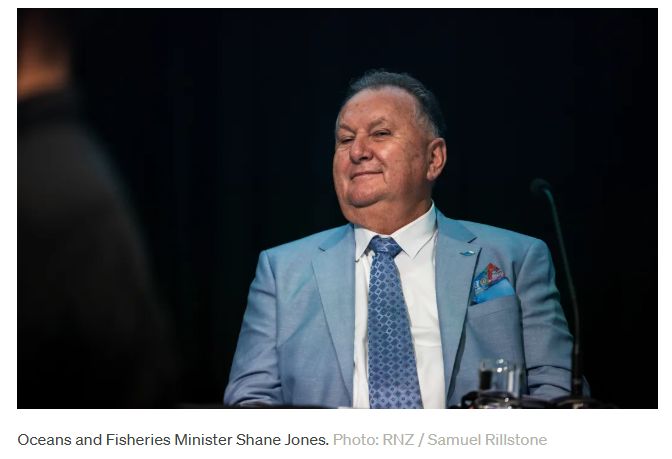
Rachel
Helyer Donaldson, Journalist

- SPCA
requires an animal welfare code for aquaculture to guard
farmed fish - It says code would assist
the sector entry worldwide markets the place manufacturing facility
farming is more and more beneath
scrutiny - Oceans and Fisheries
Minister says this is able to be a “luxurious” within the present
financial setting
Oceans and
Fisheries Minister Shane Jones is ruling out an animal
welfare code for aquaculture, saying it’s “anti-Kiwi” and
an “indulgence”.
The SPCA has referred to as for a code to
shield farmed fish, following a authorities plan to develop the
business’s income to $3 billion yearly by
2035.
Scientific officer Marie McAninch mentioned a code
would additionally assist give the aquaculture sector entry to the
types of worldwide markets that land-based farmers
profit from, because of their animal welfare
codes.
“New Zealanders care about how farmed animals
are handled – and so do folks abroad who purchase our
merchandise. They will count on that farmed fish in aquaculture are
handled properly and that their welfare meets our animal welfare
legal guidelines.
“A code of welfare for aquaculture would assist
make that occur. However proper now, New Zealand’s Aquaculture
Technique – and the Aquaculture
Improvement Technique that Shane Jones introduced in March
– are each fully silent on the welfare of the animals
being farmed.”
Commercial – scroll to proceed studying
Jones mentioned he wouldn’t be contemplating
an animal welfare code.
“Most definitely not. I believe
these impositions are anti-Kiwi. We’re within the midst of a
set of financial challenges the place we should develop and develop the
footprint of aquaculture. It is all going to finish up [as food
for] human consumption or pet consumption.”
Jones mentioned
current fish farmers already did “an excellent job” of
taking care of their inventory. “All of those animal husbandry
companies, there’s at all times scope for enchancment. However
regulatory codes … solely signify purple tape and at a deeper
degree the place does all this finish? We’re a small financial system and a
lot of those impositions are, in my opinion, indulgences.
They’re self-importance tasks and these debates want a transparent set
of contrasting views.”
However McAninch mentioned New
Zealanders cared about how farmed animals had been handled – and
so did folks abroad who purchased merchandise from New Zealand
fish farms.
Fish had been legally recognised as sentient
beings, which meant they had been able to feeling ache,
stress and constructive emotional states, she mentioned.
The
SPCA was not towards aquaculture, McAninch mentioned.
“However
we do consider it is essential to ensure all farmed animals –
and any wild animals affected by these programs – are
correctly protected. Our land-based farming sectors take
pleasure of their animal welfare codes, and it is helped them
with entry to worldwide markets. If the aquaculture
sector would not plan for this now, they danger falling behind
in a world setting the place manufacturing facility farming is
more and more beneath scrutiny.”
Jones mentioned he was “the
first to confess a few of my views is perhaps a bit tough to
abdomen”. However animal advocates had been “on a trajectory of
mission creep, and I type of really feel it is anti-Kiwi,” he
mentioned.
“I can perceive that little kittens and canine
that chunk youngsters and different welfare issues [are] an
established a part of rural life and our ethos, however suggesting
that individuals rising salmon, new fish species and certainly
shellfish … we have already got a system by way of the Useful resource
Administration Act that offers with the results of such
exercise.”
Jones described a current outcry by animal
lovers about farming
octopuses, that are sentient beings, as “the peak of
this folly”.
“We have to develop business, we do not need
to impose these city primarily based self-importance beliefs of fundamental
industrial progress prospects.”
Octopus farming was
banned in america in Washington and California due
to animal welfare considerations, and consideration of a ban is
additionally underway in three extra states.
However Jones mentioned New
Zealand couldn’t afford such “luxurious
indulgences”.
“It isn’t one thing that I’ll
encourage, it is definitely not one thing I’ll push
ahead, or agree with, at a time now we have massive competing
goals and different targets that I believe society ought to set
its thoughts upon.”
The SPCA would welcome talks with the
minister about how a welfare code may assist make sure the
aquaculture sector was sustainable and resilient, McAninch
mentioned.
There’s presently no code of welfare for farmed
fish species, though the New Zealand Salmon Farmers
Affiliation has developed a voluntary welfare commonplace for
farmed salmon in New Zealand. The Animal Welfare Act 1999
(the AWA) and the Code of Welfare for Industrial Slaughter
applies to farmed fish and for any fish which are meant to
be held or transported reside.
The Nationwide Animal
Welfare Advisory Committee (NAWAC) has recognized
improvement of a code of welfare for farmed fish for
consideration as a future precedence.
The Minister in
cost of Animal Welfare, Affiliate Minister of Agriculture
Andrew Hoggard mentioned NAWAC set its personal work programme and
schedule for code critiques, however he had requested it to prioritise
manufacturing livestock codes, and the rodeo
code.
“A number of of those codes have been beneath overview
for a while and the industries involved want certainty. I
count on NAWAC to ship on these codes earlier than turning their
consideration to different animal
species.”
© Scoop Media







